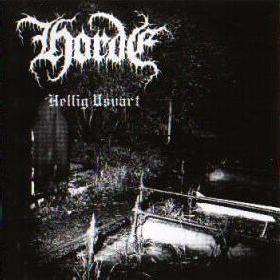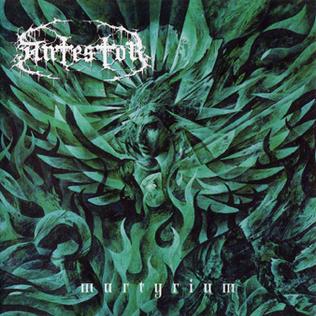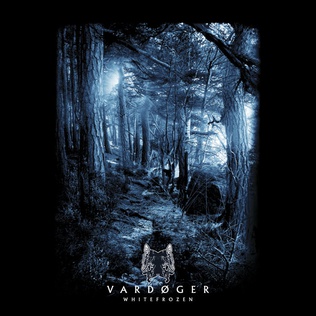Black metal is an extreme subgenre of heavy metal music. Common traits include fast tempos, a shrieking vocal style, heavily distorted guitars played with tremolo picking, raw (lo-fi) recording, unconventional song structures, and an emphasis on atmosphere. Artists often appear in corpse paint and adopt pseudonyms.
Viking metal is a subgenre of heavy metal music characterized by a lyrical and thematic focus on Norse mythology, Norse paganism, and the Viking Age. Viking metal is quite diverse as a musical style, to the point where some consider it more a cross-genre term than a genre, but it is typically heard as black metal with influences from Nordic folk music. Common traits include a slow-paced and heavy riffing style, anthemic choruses, use of both sung and harsh vocals, a reliance on folk instrumentation, and often the use of keyboards for atmospheric effect.
Christian metal, also known as white metal, Jesus metal, or heavenly metal, is heavy metal music distinguished by its Christian-themed song lyrics and the dedication of the band-members to Christianity. Christian metal is typically performed by professed Christians, principally for Christians and is often produced and distributed through various Christian networks.

Antestor is a Norwegian Christian extreme metal band formed in 1990 in Jessheim. Credited for starting the northern European Christian black metal scene, Antestor is the only Christian band to have an album released by Cacophonous Records, which has also released records by bands such as Dimmu Borgir, Sigh, and Cradle of Filth. The band's only release on Cacophonous, The Return of the Black Death, proved influential for the Christian black metal movement; it has sold over 10,000 copies.

Primordial are an Irish extreme metal band from Skerries, County Dublin. The band was formed in 1993 by bassist Pól MacAmhlaigh and guitarist Ciarán MacUiliam. Their sound blends black metal with Celtic music.

Horde is an unblack metal solo project of Australian musician Jayson Sherlock, formerly of Mortification and Paramaecium. In 1994, the only studio album, Hellig Usvart, was released on Nuclear Blast Records. With a session line-up, Horde played live in 2006 in Norway and in 2010 in Finland and Germany.
Unblack metal is a religious philosophy and subgenre within black metal, inheriting several characteristics of it, such as the melody, the lyrics and the aesthetics, whose artists either directly oppose the Satanism prevalent in most black metal, or promote Christianity in their lyrics and imagery. Unblack metal artists are controversial within the black metal subculture, because black metal's pioneers, especially those of the Second Wave, were anti-Christian. It is also suggested that Christianity contradicts black metal's dark nature and the individualistic and misanthropic ideals of many bands.

The Forsaken is the third studio album by the Christian black metal band Antestor, released in 2005 on Endtime Productions. The album features guest appearances of the established metal musicians Jan Axel Blomberg (Hellhammer) and Ann-Mari Edvardsen.

Hellig Usvart is the debut studio album by Australian unblack metal band Horde, released on Nuclear Blast Records in 1994. Upon its release, the album created a controversy among many black metal fans; death threats were sent to Nuclear Blast demanding the label to drop the album from its catalogue because the album contains Christian, anti-satanic lyrics, counteracting the usual black metal thematics at the time. As a result of the strong lyrical contradiction, the album was thought to be a parody of the Norwegian black metal movement by magazines such as Morgenbladet in 1995.

Martyrium is a studio album by the Norwegian unblack metal band Antestor; while it was the first album recorded by the band, it was their sophomore release. It is one of the earliest Christian extreme metal albums released in Norway. Recorded in 1994, Martyrium was not immediately released, though bootleg copies of the album were printed in 1997 by Morphine Records. It then gained a cult following among a small audience until it was officially released in the year 2000 by Endtime Productions.

Drottnar is an extreme metal band from Fredrikstad, Norway. Formed in 1996, the band has released four albums, Spiritual Battle (2000), Welterwerk (2006), Stratum (2012) and Monolith (2019) and an EP titled Anamorphosis (2003). The first album was released on UK label Plankton Records. They are currently signed to Swedish label Endtime Productions.
Vaakevandring was a Norwegian unblack metal band that was active from 1996 to 2007. The name in Norwegian is a reference to the resurrection of Jesus. Vaakevandring played symphonic black metal with influences from Norwegian folk music.

Det Tapte Liv is an EP by the Norwegian unblack metal band Antestor, released in 2004 by Endtime Productions.

The Defeat of Satan is an album by the Norwegian band Antestor. The album consists of their first two demos Despair (1993) and The Defeat of Satan (1991). The songs were remastered and remixed in 2003 and was published by the Norwegian label Momentum Scandinavia. The demos on this album are historical since they were one of the few Christian metal releases during the time when the black metal movement was developing significantly and drew media attention with violent actions such as the church burnings.

Omen is the fourth studio album by the Norwegian Christian extreme metal band Antestor, released by Bombworks Records on November 16, 2012. Recording began in 2011, and was mostly conducted at the home of vocalist Ronny Hansen. The album cover is a painting by Polish artist Zdzisław Beksiński, and depicts a deformed, many-fingered humanoid creature playing a trumpet. Antestor met with critical praise for its musicianship and the progressive sound on the recording. Critics described the sound as primarily black metal, though the band prefers the more general term "extreme metal" to describe the sound on Omen.
Schaliach was a Christian metal band formed by Peter Dalbakk and Ole Børud from Hamar, Norway. Dalbakk served as the band's vocalist, while Børud handled all the instrumentation. In 1995, the duo released a 3-song demo. The following year, they debuted with a studio album, Sonrise, in 1996 through Petroleum Records. Three songs from that recording were then featured on the Rowe Productions compilation album Northern Lights: Norwegian Metal Compilation, which was also released in 1996. The band also contributed the song "Purple Filter" to the compilation album In the Shadow of Death: A Scandinavian Extreme Music Compilation, released in 2000 through Endtime Productions. "Purple Filter" was also included as a bonus track on the 2005 re-lease of Sonrise. Dalbakk was also part of the unblack metal band Vardøger, and Børud had joined the progressive death metal band Extol and also started a career as a solo artist. The two artists would years later, in 2015, team up again to found the progressive death metal project Fleshkiller.
Elgibbor or Fire is an unblack metal project by Jarek Pozarycki that started in 1999. The band went on a hiatus around 2017, but reconvened with a full-lineup in 2020, consisting mostly of former live members.
Temple of Perdition is a black metal project that began in September 2017, between Ya'akov Nahash, Joonas Heikkinen, and Benainah, out of Texas in the United States and Finland. Shortly after their formation, the band signed with Vision of God Records.
Vardøger was a Christian extreme metal band from Hamar, Norway. Formed in 1994 under the name Hidden Paradise, the members of the band at the time were all involved in other musical projects and so treated Hidden Paradise as a side project. Several songs were written between 1995 and 1997, almost enough for an entire album, and the band changed its name to Vardøger, but the group disbanded before an album could be released. In 2000, the band contributed the symphonic black metal song "Footprints of Thunder" to the compilation album In the Shadow of Death: A Scandinavian Extreme Music Compilation. The song was covered in 2019 by Irgalom on their Meditate I album.

Whitefrozen is the 2003 debut EP by the Norwegian unblack and Viking metal band Vardøger. Vardøger formed in 1994, under the name Hidden Paradise, as a side project of its constituent musicians.












